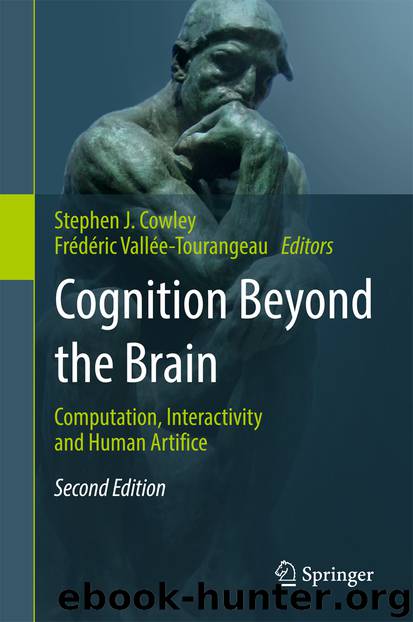Cognition Beyond the Brain by Stephen J. Cowley & Frédéric Vallée-Tourangeau

Author:Stephen J. Cowley & Frédéric Vallée-Tourangeau
Language: eng
Format: epub
Publisher: Springer International Publishing, Cham
To reiterate, this does not mean that there is no introspection or that we cannot discuss individual cognition as a functional entity, but it suggests that the very definition of cognition and subjectivity needs to include elements beyond neural networks in order to adequately describe and predictively model cognitive function and subjective, phenomenological epistemology . The subjective emerges from the distributed, the situational, and the multi-scalar temporal.
From an MST cognition perspective, findings that suggest the epistemic commitments of human beings are malleable and subject to change, that challenge the notion of a stable ‘self’ and a stable personality, and that shows the influence of memories, socio-cultural background, and choice frames do not delineate limitations of cognition or functionality . Rather, they are integral elements of what makes human cognition possible to begin with. In an interesting manner, it suggests that rationality and reasonableness can lead to different conclusions and decisions at different points in time, meaning that inconsistencies need not be irrational or ‘wrong’, but simply that the emergent subjective perception of the world to the self in that moment leads to different outcomes.9 This opens up for exciting explorations regarding epistemology, decision-making, and other crucial cognitive phenomena, as it suggests a dynamic and fluctuating rather than a stable and universal foundation for cognition (i.e. the same elements may instantiate differently regarding weight, role, involvement and interaction in different individuals, situations, and cultures). The possible descriptions and models that may follow from a broader notion of cognition should be explored in more detail to determine if the hypothesis is valid. At present the evidence is indicative, but I hope that the argument advanced throughout the chapter seems compelling: namely that reasonable cognition functionality causally depends on an interaction between internal mechanisms, externally distributed interactions, and multi-scalar temporal elements. The specific instantiation and function of these will depend on the function under investigation and the manifestation of that function at a specific place and time.10 This points to exciting new programs of research that integrates MSTs in models of cognitive function.
Download
This site does not store any files on its server. We only index and link to content provided by other sites. Please contact the content providers to delete copyright contents if any and email us, we'll remove relevant links or contents immediately.
The Mikado Method by Ola Ellnestam Daniel Brolund(22542)
Hello! Python by Anthony Briggs(21722)
Secrets of the JavaScript Ninja by John Resig Bear Bibeault(20297)
Dependency Injection in .NET by Mark Seemann(19635)
The Well-Grounded Java Developer by Benjamin J. Evans Martijn Verburg(19403)
Kotlin in Action by Dmitry Jemerov(19348)
Sass and Compass in Action by Wynn Netherland Nathan Weizenbaum Chris Eppstein Brandon Mathis(14284)
Secrets of the JavaScript Ninja by John Resig & Bear Bibeault(12244)
Jquery UI in Action : Master the concepts Of Jquery UI: A Step By Step Approach by ANMOL GOYAL(10069)
Svelte with Test-Driven Development by Daniel Irvine(8157)
Test-Driven Development with PHP 8 by Rainier Sarabia(7902)
Layered Design for Ruby on Rails Applications by Dementyev Vladimir;(7720)
Web Development with Django by Ben Shaw Saurabh Badhwar(7232)
React Application Architecture for Production by Alan Alickovic(6916)
Software Architecture for Web Developers by Mihaela Roxana Ghidersa(4998)
Audition by Ryu Murakami(4923)
Accelerating Server-Side Development with Fastify by Manuel Spigolon Maksim Sinik & Matteo Collina(4854)
Solidity Programming Essentials by Ritesh Modi(4584)
Functional Programming in JavaScript by Mantyla Dan(4516)
